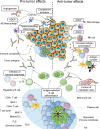B cells and cancer: To B or not to B?
- PMID: 33601413
- PMCID: PMC7754675
- DOI: 10.1084/jem.20200851
B cells and cancer: To B or not to B?
Abstract
Whereas T cells have been considered the major immune cells of the tumor microenvironment able to induce tumor regression and control cancer clinical outcome, a burst of recent publications pointed to the fact that B cells may also play a prominent role. Activated in germinal centers of tertiary lymphoid structures, B cells can directly present tumor-associated antigens to T cells or produce antibodies that increase antigen presentation to T cells or kill tumor cells, resulting in a beneficial clinical impact. Immune complexes can also increase inflammation, angiogenesis, and immunosuppression via macrophage and complement activation, resulting in deleterious impact.
© 2020 Fridman et al.
Conflict of interest statement
Disclosures: T.W.-W. Chen reported personal fees from Novartis, Roche, Eli Lilly, Daiichi Sankyio, and Eisai outside the submitted work. No other disclosures were reported.
Figures


References
-
- Affara N.I., Ruffell B., Medler T.R., Gunderson A.J., Johansson M., Bornstein S., Bergsland E., Steinhoff M., Li Y., Gong Q., et al. . 2014. B cells regulate macrophage phenotype and response to chemotherapy in squamous carcinomas. Cancer Cell. 25:809–821. 10.1016/j.ccr.2014.04.026 - DOI - PMC - PubMed
-
- Ajona D., Pajares M.J., Corrales L., Perez-Gracia J.L., Agorreta J., Lozano M.D., Torre W., Massion P.P., de-Torres J.P., Jantus-Lewintre E., et al. . 2013. Investigation of complement activation product c4d as a diagnostic and prognostic biomarker for lung cancer. J. Natl. Cancer Inst. 105:1385–1393. 10.1093/jnci/djt205 - DOI - PMC - PubMed
-
- Barbera-Guillem E., Nelson M.B., Barr B., Nyhus J.K., May K.F. Jr., Feng L., and Sampsel J.W.. 2000. B lymphocyte pathology in human colorectal cancer. Experimental and clinical therapeutic effects of partial B cell depletion. Cancer Immunol. Immunother. 48:541–549. 10.1007/PL00006672 - DOI - PMC - PubMed
Publication types
MeSH terms
Substances
LinkOut - more resources
Full Text Sources
Other Literature Sources
Medical

